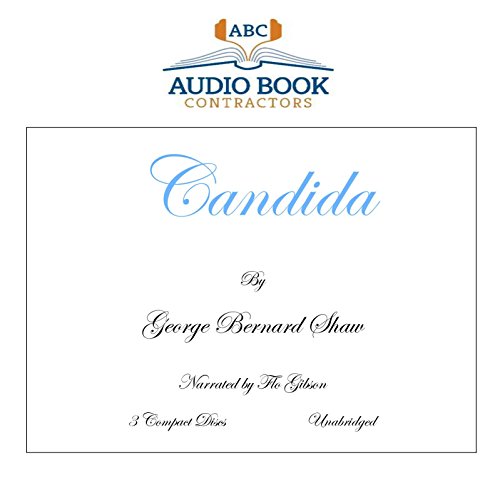-
Candida
George Bernard Shaw, Bernard Shaw
Paperback (Digireads.com, Jan. 1, 2006)"Candida" is the story of its title character, a woman who is married to the Reverend Morell. Candida is a woman of many talents and her husband has his wife to thank for much of his success. When a young man by the name of Marchbanks professes his love for Candida, Morell must reexamine his relationship with his wife and ultimately discovers a side to her that he never knew existed. "Candida" is a play written during a time of great empowerment of women and Shaw brilliantly offers up Candida as an example of a strong and intelligent woman.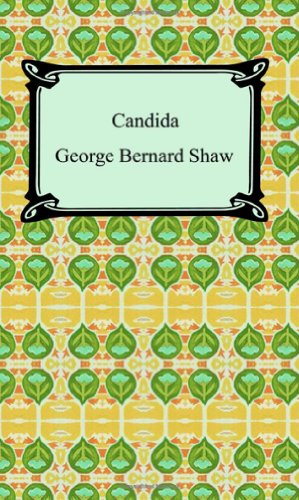
-
Candida
George Bernard Shaw
Paperback (CreateSpace Independent Publishing Platform, Dec. 29, 2017)Candida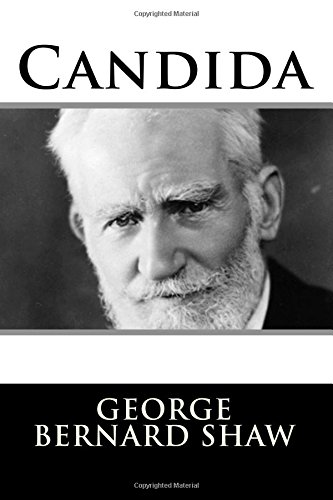
-
Candida
George Bernard Shaw, Will Jonson
Paperback (CreateSpace Independent Publishing Platform, Feb. 5, 2015)Shaw believed that theatre audiences of the 1890s deserved more than the hollow spectacle and sham he saw displayed on the London stage. But he also recognized that people wanted to be entertained while educated, and to see purpose mixed with pleasure. Shaw mocks deluded idealism in 'Candida', when a young poet becomes infatuated with the wife of a Socialist preacher.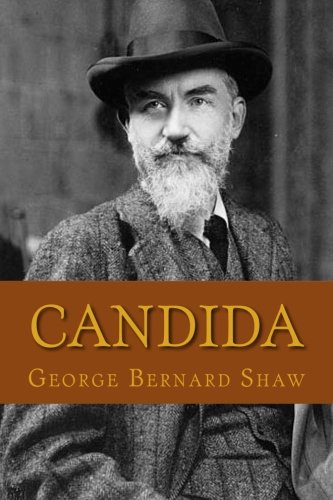
-
Candida
George Robert Shaw
Paperback (CreateSpace Independent Publishing Platform, May 9, 2018)George Bernard Shaw was an Irish writer who is considered to be one of the greatest playwrights of the late 19th and early 20th centuries. Shaw's first major success was Arms and the Man, written in 1894, and he would go on to write other classics including Pygmalion, Major Barbara, and Mrs. Warren's Profession. Candida is a play that centers around the wife of a revered clergyman. When she meets a young poet named Eugene Marchbanks he quickly finds out that his assumptions in regards to Candida are not correct.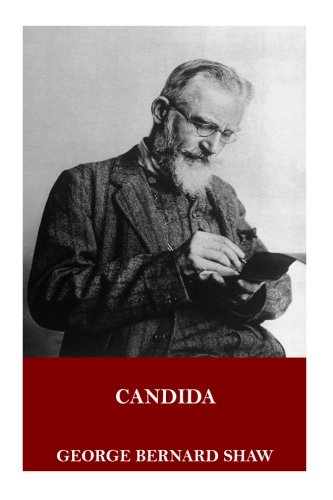
-
Candida
George Bernard Shaw
Hardcover (Kessinger Publishing, LLC, Sept. 10, 2010)This scarce antiquarian book is a facsimile reprint of the original. Due to its age, it may contain imperfections such as marks, notations, marginalia and flawed pages. Because we believe this work is culturally important, we have made it available as part of our commitment for protecting, preserving, and promoting the world's literature in affordable, high quality, modern editions that are true to the original work.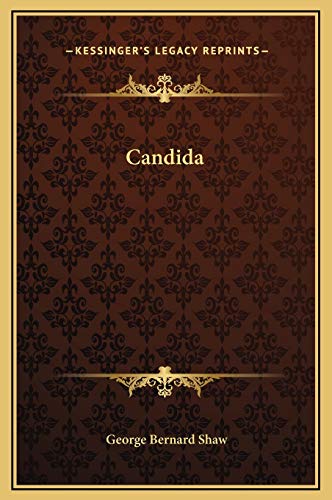
-
Candida
George Bernard Shaw
Paperback (CreateSpace Independent Publishing Platform, July 28, 2014)Candida, a comedy by playwright George Bernard Shaw, was written in 1894 and first published in 1898, as part of his Plays Pleasant. The central characters are clergyman James Morell, his wife Candida and a youthful poet, Eugene Marchbanks, who tries to win Candida's affections. The play questions Victorian notions of love and marriage, asking what a woman really desires from her husband. The cleric is a Christian Socialist, allowing Shaw—himself a Fabian Socialist—to weave political issues, current at the time, into the story. Shaw attempted but failed to have a London production of the play put on in the 1890s, but there were two small provincial productions. However, in late 1903 actor Arnold Daly had such a great success with the play that Shaw would write by 1904 that New York was seeing "an outbreak of Candidamania". The Royal Court Theatre in London performed the play in six matinees in 1904. The same theatre staged several other of Shaw's plays from 1904 to 1907, including further revivals of Candida. The play is set in the northeast suburbs of London in the month of October. It tells the story of Candida, the wife of a famous clergyman, the Reverend James Mavor Morell. Morell is a Christian Socialist, popular in the Church of England, but Candida is responsible for much of his success. Candida returns home briefly from a trip to London with Eugene Marchbanks, a young poet who wants to rescue her from what he presumes to be her dull family life. Marchbanks is in love with Candida and believes she deserves something more than just complacency from her husband. He considers her divine, and his love eternal. In his view, it is quite improper and humiliating for Candida to have to attend to petty household chores. Morell believes Candida needs his care and protection, but the truth is quite the contrary. Ultimately, Candida must choose between the two gentlemen. She reasserts her preference for the "weaker of the two" who, after a momentary uncertainty, turns out to be her husband Morell. The play was first performed at the Theatre Royal, South Shields on 30 March 1895. It was revived by the Independent Theatre Company, at Her Majesty's, Aberdeen on 30 July 1897. It was first performed in London at the Stage Society, The Strand, on 1 July 1900. However, it was not until late 1903, when Arnold Daly mounted a production in New York that the play became a success. Daly's production was quickly followed by one in London. The first public performance in London was on 26 April 1904, at the Royal Court The play was so popular in 1904 that the phenomenon was referred to as "Candidamania". In the words of The New York Sun, A new complaint has become widespread. It may be described as 'Candidamania.' It is a contagious disease, frequently caught in street cars, elevated trains, department stores, restaurants, and other places where people talk about what they did the night before. 'Have you seen Candida?' is the question of the hour. Thousands are dragging their friends to see Mr. Shaw's play."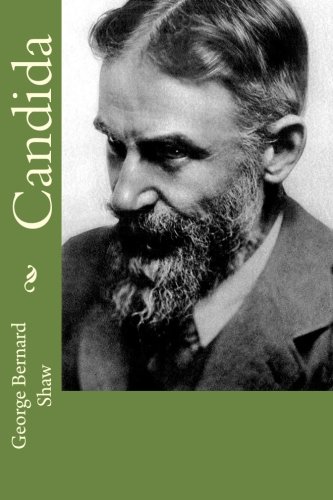
-
Candida
Bernard Shaw, William-Alan Landes
Paperback (Players Pr, June 1, 1993)This scarce antiquarian book is a facsimile reprint of the original. Due to its age, it may contain imperfections such as marks, notations, marginalia and flawed pages. Because we believe this work is culturally important, we have made it available as part of our commitment for protecting, preserving, and promoting the world's literature in affordable, high quality, modern editions that are true to the original work.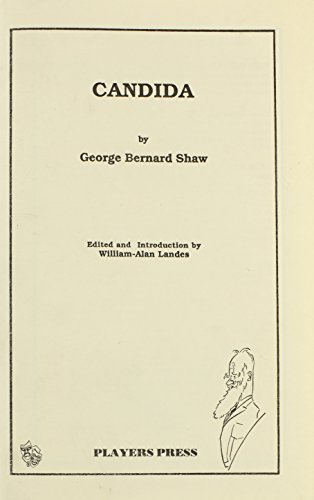
-
Candida
George Bernard Shaw
Paperback (IndoEuropeanPublishing.com, July 21, 2019)Candida, a comedy by playwright George Bernard Shaw, was written in 1894 and first published in 1898, as part of his Plays Pleasant. The central characters are clergyman James Morell, his wife Candida and a youthful poet, Eugene Marchbanks, who tries to win Candida's affections. The play questions Victorian notions of love and marriage, asking what a woman really desires from her husband. The cleric is a Christian Socialist, allowing Shaw—himself a Fabian Socialist—to weave political issues, current at the time, into the story.Shaw attempted but failed to have a London production of the play put on in the 1890s, but there were two small provincial productions. However, in late 1903 actor Arnold Daly had such a great success with the play that Shaw would write by 1904 that New York was seeing "an outbreak of Candidamania". The Royal Court Theatre in London performed the play in six matinees in 1904. The same theatre staged several other of Shaw's plays from 1904 to 1907, including further revivals of Candida. (wikipedia.org)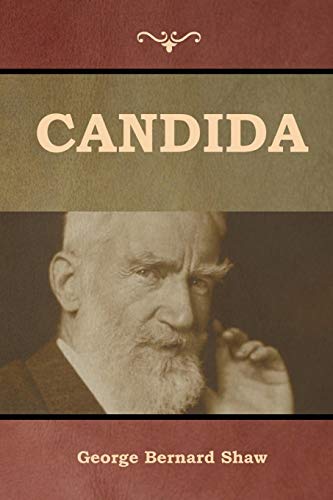
-
Candida
Bernard Shaw
Paperback (CreateSpace Independent Publishing Platform, July 9, 2016)Candida - Bernard Shaw - Candida, a comedy by playwright George Bernard Shaw, was written in 1894 and first published in 1898, as part of his Plays Pleasant. The central characters are clergyman James Morell, his wife Candida and a youthful poet, Eugene Marchbanks, who tries to win Candida's affections. The play questions Victorian notions of love and marriage, asking what a woman really desires from her husband. The cleric is a Christian Socialist, allowing Shaw—himself a Fabian Socialist—to weave political issues, current at the time, into the story. Shaw attempted but failed to have a London production of the play put on in the 1890s, but there were two small provincial productions. However, in late 1903 actor Arnold Daly had such a great success with the play that Shaw would write by 1904 that New York was seeing "an outbreak of Candidamania". The Royal Court Theatre in London performed the play in six matinees in 1904. The same theatre staged several other of Shaw's plays from 1904 to 1907, including further revivals of Candida.
-
Candida
George Bernard Shaw
Audio CD (L.A. Theatre Works, Jan. 1, 1994)This warm and witty Shaw play challenged conventional wisdom about relationships between the sexes. A beautiful wife must choose between the two men who love her.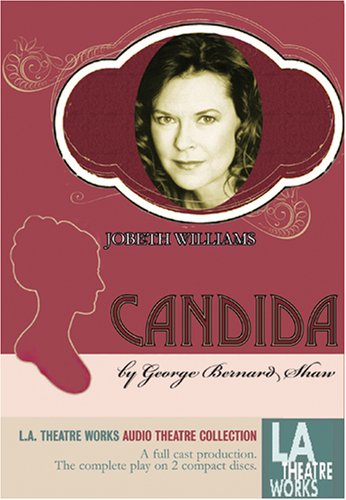
-
Candida
George Bernard Shaw
Paperback (CreateSpace Independent Publishing Platform, April 30, 2011)This collection chronicles the fiction and non fiction classics by the greatest writers the world has ever known. The inclusion of both popular as well as overlooked pieces is pivotal to providing a broad and representative collection of classic works.
-
Candida
George Bernard Shaw, Flo Gibson (Narrator)
Audio CD (Audio Book Contractors, Inc., June 25, 2011)In this poignant play Candida, the wife of the Rev. James Morell, is loved by the visionary and sensitive young poet, Eugene Marchbanks. The two men agree that Candida is to make her choice. She demands that they bid for her. (Three CDs)